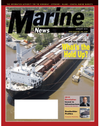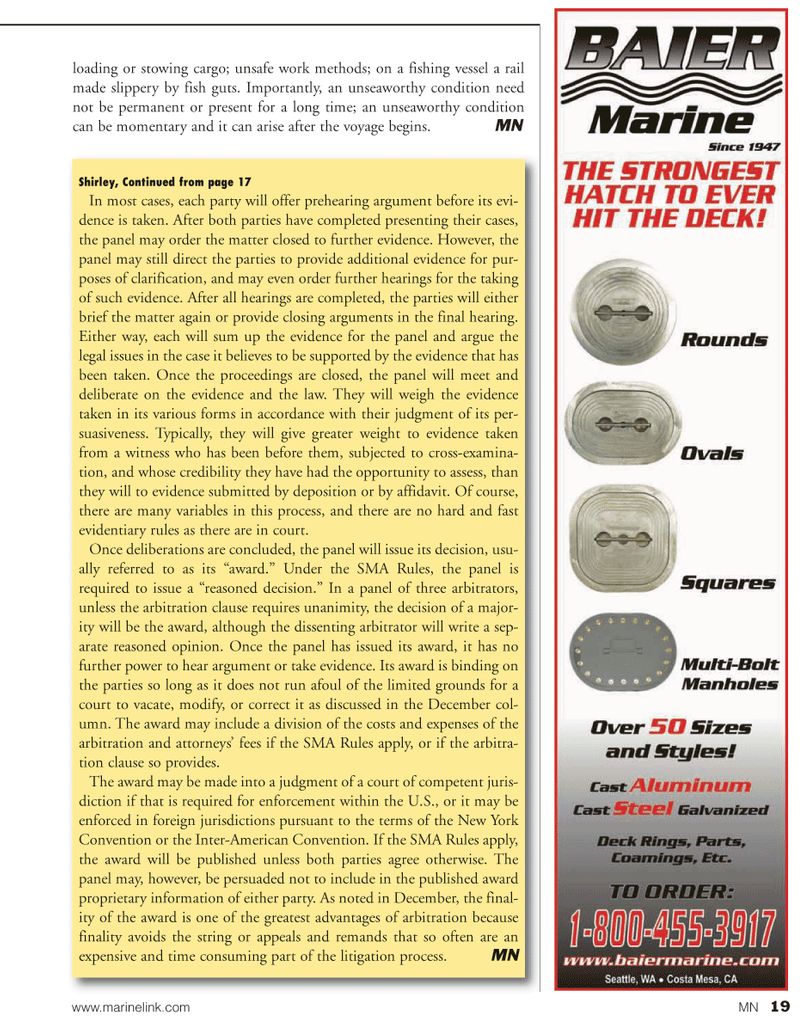
Page 19: of Marine News Magazine (January 2, 2010)
Read this page in Pdf, Flash or Html5 edition of January 2, 2010 Marine News Magazine
loading or stowing cargo; unsafe work methods; on a fishing vessel a rail made slippery by fish guts. Importantly, an unseaworthy condition need not be permanent or present for a long time; an unseaworthy condition can be momentary and it can arise after the voyage begins. MN www.marinelink.com MN 19
Shirley, Continued from page 17
In most cases, each party will offer prehearing argument before its evi- dence is taken. After both parties have completed presenting their cases, the panel may order the matter closed to further evidence. However, the panel may still direct the parties to provide additional evidence for pur- poses of clarification, and may even order further hearings for the taking of such evidence. After all hearings are completed, the parties will either brief the matter again or provide closing arguments in the final hearing.
Either way, each will sum up the evidence for the panel and argue the legal issues in the case it believes to be supported by the evidence that has been taken. Once the proceedings are closed, the panel will meet and deliberate on the evidence and the law. They will weigh the evidence taken in its various forms in accordance with their judgment of its per- suasiveness. Typically, they will give greater weight to evidence taken from a witness who has been before them, subjected to cross-examina- tion, and whose credibility they have had the opportunity to assess, than they will to evidence submitted by deposition or by affidavit. Of course, there are many variables in this process, and there are no hard and fast evidentiary rules as there are in court.
Once deliberations are concluded, the panel will issue its decision, usu- ally referred to as its “award.” Under the SMA Rules, the panel is required to issue a “reasoned decision.” In a panel of three arbitrators, unless the arbitration clause requires unanimity, the decision of a major- ity will be the award, although the dissenting arbitrator will write a sep- arate reasoned opinion. Once the panel has issued its award, it has no further power to hear argument or take evidence. Its award is binding on the parties so long as it does not run afoul of the limited grounds for a court to vacate, modify, or correct it as discussed in the December col- umn. The award may include a division of the costs and expenses of the arbitration and attorneys’ fees if the SMA Rules apply, or if the arbitra- tion clause so provides.
The award may be made into a judgment of a court of competent juris- diction if that is required for enforcement within the U.S., or it may be enforced in foreign jurisdictions pursuant to the terms of the New York
Convention or the Inter-American Convention. If the SMA Rules apply, the award will be published unless both parties agree otherwise. The panel may, however, be persuaded not to include in the published award proprietary information of either party. As noted in December, the final- ity of the award is one of the greatest advantages of arbitration because finality avoids the string or appeals and remands that so often are an expensive and time consuming part of the litigation process. MN

 18
18

 20
20
